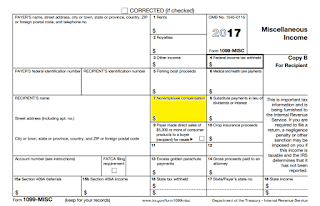- In July 2017, a Watertown, New York, restaurateur was sentenced to 150 months in prison for tax evasion and investment fraud. He engaged in a scheme to evade more than $4 million in taxes and obstruct the IRS.
- In October 2017, a Grand Junction, Colorado, business owner was sentenced to 88 months in prison for tax evasion and failing to file corporate and individual tax returns. He had not filed a personal tax return since 1992 and had not paid individual income taxes since 1993.
- In January 2017, a St. Louis, Missouri, tax return preparation business owner was sentenced to 27 months in prison for tax evasion. He underreported his businesses’ gross receipts by over $1.5 million and evaded over $580,000 in tax.
- In August 2017, a south Florida salesman was sentenced to 12 months and one day in prison for tax evasion. From 2002 to 2015, he earned over $1.5 million in income selling hurricane resistant windows and evaded paying over $350,000 in taxes. Except for the 2007 tax year, he had not filed an income tax return since 2002.
- In March 2018, the owners of a Memphis, Tennessee, staffing company, who were husband and wife, were sent to jail for failing to pay over payroll taxes and filing false tax documents. The husband was sentenced to 75 months in prison and his wife was sentenced to one year in prison. They failed to pay over $2.8 million in withholdings and other employment taxes to the IRS and filed false employment tax returns.
- In October 2017, the owner of a Las Vegas, Nevada, strip club was sentenced to 24 months for evading employment taxes. The former owner of The Crazy Horse Too evaded paying more than $1.7 million in employment taxes.
- In July 2017, a Potomac, Maryland, doctor and entrepreneur was sentenced to 119 months and 29 days in prison for defrauding his former company’s shareholders and for failing to pay more than $7.5 million in employment taxes.
Recent Prosecutions Involving Offshore Bank Accounts
- In October 2017, two Tampa, Florida, business executives were sentenced to prison for 54 months and 72 months respectively for their roles in a conspiracy to defraud the United States using an offshore tax shelter scheme. They conspired to create and promote a sham offshore tax shelter strategy marketed to clients.
- In July 2017, a Fort Myers, Florida, businessman was sentenced to 57 months in prison for conspiring with investment advisors to hide money in offshore bank accounts. He used secret numbered bank accounts and foreign shell companies to hide millions of dollars in order to evade more than $728,000 in U.S. taxes.
- In October 2017, a Greenwich, Connecticut, resident pleaded guilty to failing to report to the Department of Treasury funds he maintained in foreign bank accounts. He opened accounts at several banks, including Credit Suisse, UBS, Bank Leu, Clariden Leu, and Bank Hofmann. In 2004, the value of his foreign accounts exceeded $28 million. For over a decade, he filed false tax returns, on which he failed to report income from his foreign accounts.
Recent Prosecutions of Attempts to Obstruct the IRS
- In July 2017, a Loveland, Colorado, businessman and delicatessen owner was sentenced to 24 months in prison for conspiring to file fraudulent claims for tax refunds. He conspired with his return preparer to file three tax returns that claimed more than $1 million in bogus refunds, of which the IRS paid $350,765. He spent the funds on precious metals and coins, a truck, jewelry, luxury travel, and sporting equipment.
- In November 2017, a Greensboro, North Carolina, resident was sentenced to 37 months in prison for corruptly endeavoring to obstruct the IRS. He filed several fraudulent tax returns with the IRS that included fake income and withholdings, which claimed over $750,000 in fraudulent refunds. He also filed documents with the Guilford County Register of Deeds purporting to renounce his United States citizenship and proclaiming to be a sovereign citizen.
- In October 2017, a Boynton Beach, Florida, resident was sentenced to 30 months in prison for obstructing the IRS. He filed fraudulent personal tax returns with the IRS that sought more than $5.6 million in fraudulent refunds, of which the IRS paid more than $485,000. He used the funds to purchase a house and multiple vehicles, including a Jaguar and Mercedes Benz.
Marini & Associates, P.A.
Read more at: Tax Times blog















